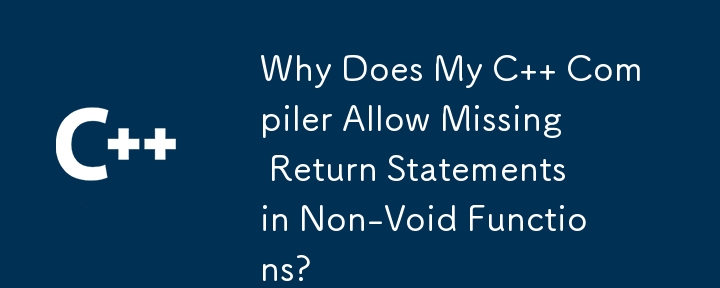Home >Backend Development >C++ >Why Does My C Compiler Allow Missing Return Statements in Non-Void Functions?
Why Does My C Compiler Allow Missing Return Statements in Non-Void Functions?
- Barbara StreisandOriginal
- 2024-11-19 04:19:03939browse

Omitting Return Statements in C : Undefined Behavior
A user stumbled upon unusual behavior with a version of g for Windows obtained through Strawberry Perl. They observed that the compiler allowed them to omit a return statement in a non-void function, which led to unexpected results.
Question:
Why did the compiler allow the omission of a return statement without issuing a warning? Does it make assumptions about returning the last-initialized variable?
Answer:
No, the compiler does not make assumptions or automatically return the last-initialized variable. Omitting a return statement in a non-void function is considered Undefined Behavior according to the ISO C -98 standard.
Explanation:
The C standard dictates that a return statement with an expression should only be used in functions that return a value. Flowing off the end of a function without a return statement is equivalent to returning no value, but this results in Undefined Behavior in functions that should return a value.
Consequences of Undefined Behavior:
Undefined Behavior is a hazardous situation where the behavior of the program becomes unpredictable. It can lead to unexpected results, runtime errors, memory corruption, or even system crashes.
Recommended Solution:
To avoid Undefined Behavior, it is crucial to explicitly include a return statement in all non-void functions, even if it means returning a default value. Additionally, enabling the -Wall compiler flag can help identify such issues during compilation.
Example:
Consider the following non-void function:
int func()
{
int a = 10;
// do something with 'a'
// omitted return statement
}
Using the value of 'func()' in code is dangerous because the omitted return statement results in Undefined Behavior.
To rectify this, a return statement should be explicitly added:
int func()
{
int a = 10;
// do something with 'a'
return a; // return the appropriate value
}
By adhering to these guidelines, programmers can avoid the pitfalls of Undefined Behavior and ensure the correctness and reliability of their C code.
The above is the detailed content of Why Does My C Compiler Allow Missing Return Statements in Non-Void Functions?. For more information, please follow other related articles on the PHP Chinese website!
Related articles
See more- How do function pointers work in C++?
- How to Choose the Right INI File Parsing Method in C ?
- Please provide your article so I can generate an English Q&A title that fits the content of the article.
- How Can I Override the Global `new` and `delete` Operators in C ?
- Exception Handling: When and How: To Throw or Not to Throw?

